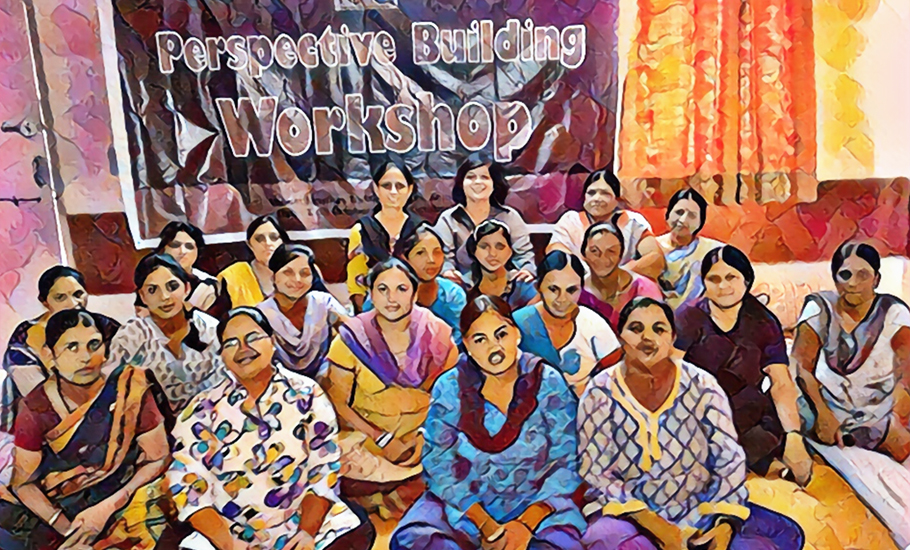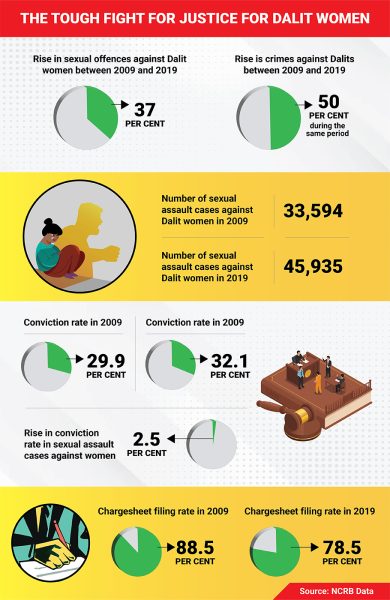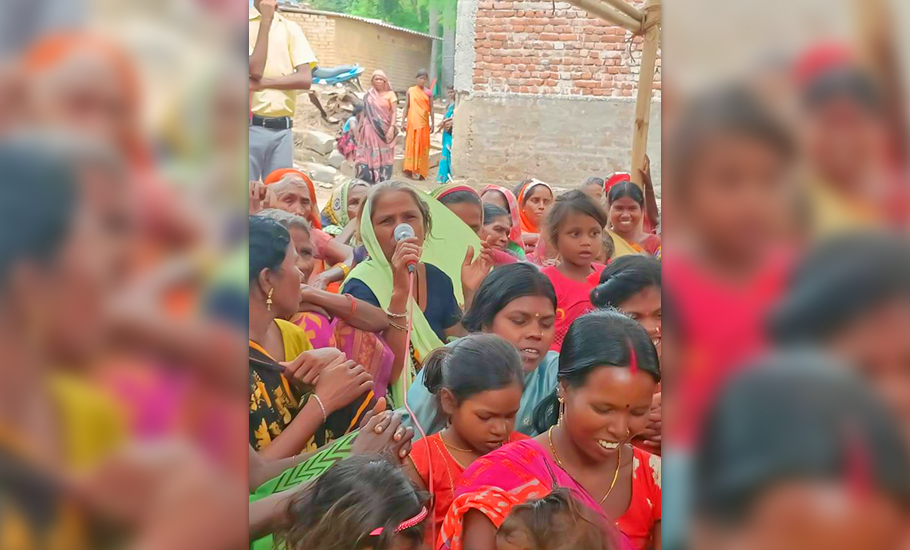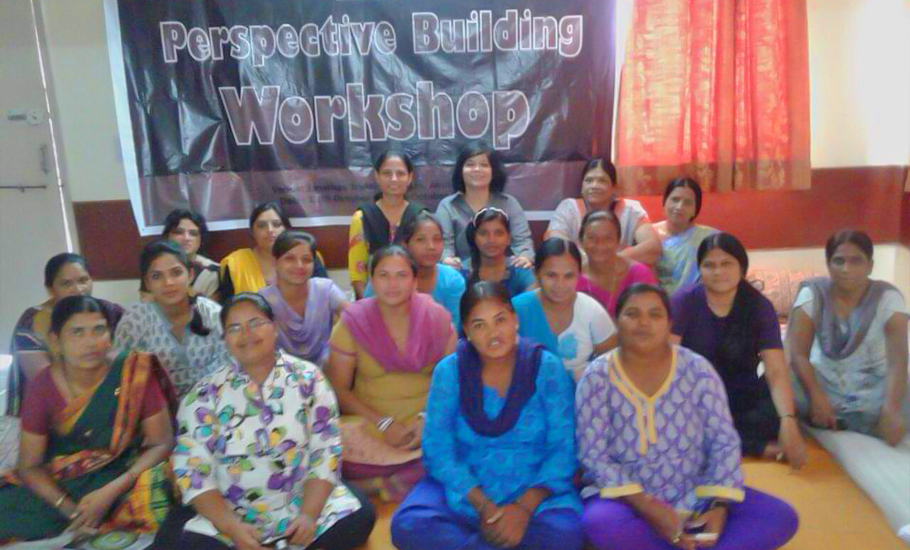
- Home
- News
- Analysis
- States
- Perspective
- Videos
- Education
- Entertainment
- Elections
- World Cup 2023
- Features
- Health
- Business
- Series
- Economy Series
- Earth Day
- Kashmir’s Frozen Turbulence
- India@75
- The legend of Ramjanmabhoomi
- Liberalisation@30
- How to tame a dragon
- Celebrating biodiversity
- Farm Matters
- 50 days of solitude
- Bringing Migrants Home
- Budget 2020
- Jharkhand Votes
- The Federal Investigates
- The Federal Impact
- Vanishing Sand
- Gandhi @ 150
- Andhra Today
- Field report
- Operation Gulmarg
- Pandemic @1 Mn in India
- The Federal Year-End
- The Zero Year
- Premium
- Science
- Brand studio
- Home
- NewsNews
- Analysis
- StatesStates
- PerspectivePerspective
- VideosVideos
- Entertainment
- ElectionsElections
- Sports
- Loading...
Sports - Features
- BusinessBusiness
- Premium
- Loading...
Premium

By Dalit women, for Dalit women: How rape victims in Gujarat are joining forces

Bhavnaben, a Dalit woman, was barely 20 when she was sexually assaulted by an upper caste man from her village in Anand district. If the assault broke her physically, the fight for justice drained her emotionally. Her own family refused to believe her. And even when through her persistence she managed to convince that she had indeed been sexually assaulted, nobody cared to ensure justice...
Bhavnaben, a Dalit woman, was barely 20 when she was sexually assaulted by an upper caste man from her village in Anand district. If the assault broke her physically, the fight for justice drained her emotionally.
Her own family refused to believe her. And even when through her persistence she managed to convince that she had indeed been sexually assaulted, nobody cared to ensure justice was done.
“Would you like to compromise,” was the first question asked to Bhavnaben by members of her own community.
“I was already in an abusive marriage when the incident happened. Like most Dalit women, nobody believed me at my home or in my community. I had nowhere to go. I was angry and wanted justice but was scared to raise my voice as I was all alone with no social, financial or emotional support,” Bhavnaben, who belongs to the Rohit sub-caste, considered lower in social hierarchy within of the Dalits, tells The Federal.

Her life changed in the year 2020 when she attended an event organised by a forum fighting for Dalit rights in Gujarat and met Manjula Pradeep, an activist who enjoys an experience of over 30 years in the area.
One year later, Manjula gave her forum a name — National Council of Women Leaders — and dedicated it to fight for the rights of women such as Bhavnaben. What made her organisation unique was that her volunteers include women who have been victims of sexual assault at some point.
“When I heard Manjulaben in 2020, I felt for the first time that justice was accessible to even women like me,” Bhavnaben recalls.

Just three years down the line, Bhavnaben is herself a Dalit women rights activist who counsels and helps other survivors of sexual violence. Married at the age of 16, she did not get the opportunity to finish school but Bhavnaben got the chance to complete her education when she joined Manjula Pradeep. She is one among dozens of Dalit women activists Manjula has been training to help rape survivors, especially those from the Scheduled Caste communities to navigate through the legal justice system.
“Usually, we go to the home of the victim when we get to know about an incident. It is usually two to days after the incident that we get the information. The first thing we do is try and talk to the victim and get to ease her by, for instance, asking for water or tea,” she says.
“In cases of rape often victims feel responsible for the crime. Their cultural setting makes them believe they must have done something wrong because of which the assault happened. Since the victims are mostly in mental trauma and blame themselves, we try to ease them so that they understand that they are not at fault in any way.”
“We don’t force them to say anything. They open up only if they want to confide. When the victim opens up, we offer her help and tell her that although it is her fight, she isn’t alone. We women, have been in similar situations so we can fully empathise. Usually, the Dalit women are uneducated and hardly have any exposure to the world beyond their homes or villages. So, it is a Herculean task to prepare them for the legal process,” Bhavnaben tell The Federal.
“The discrimination begins right at the police station when one tries to file an FIR. Most police stations don’t have enough female staff. So, the victim has to narrate her ordeal to a male cop who is neither sensitive nor respectful towards her. It is a scary situation for the victim. Women of our organisation accompany the victims to police stations. Usually, the victim is not in a state of mind to cope with the questions asked at the police station,” she says.
An attempt is often made to discredit the victim and break their morale by raising questions over their ‘real motive’ to file the complaint. Most police personnel try to brush aside the complaints as a ‘deal gone wrong’.

“We make sure the complaint is filed as narrated by the victim amid questions like are you doing this for money, since you are Dalit and poor. There are also insensitive comments passed like it is usual for people like you to trap rich men and extort money. Did you (victim) not get your money yet,” adds Bhavnaben.
Dalit women are doubly disadvantaged. One is, of course, by virtue of being women and the second disadvantage is their social marginalisation because of their caste.
“The Dalit women, who are mostly uneducated, are the worst sufferers of a systemic failure in dealing with caste-based crimes in our country. They are vulnerable to double discrimination – gender-based violence at home and as targets of caste atrocity by upper caste men,” Manjula Pradeep says.
“The entire legal justice system is prejudiced against Dalit women. In the courts, they usually have to face the worst kind of victim shaming with questions like — why would men from the upper caste rape her? She is an untouchable. She must have invited them for a sexual encounter,” shares Pradeep.
“During the pandemic when I was documenting cases of sexual violence, I felt it was time that an organisation was formed to help empower Dalit women. Hence, the National Council of Women Leaders was founded in 2021,” she adds.
In two years since it was founded, the National Council of Women Leaders, has brought together a group of Dalit women from across the country who are now armed with the knowledge and skills to navigate the legal system and cope with victim shaming and threats from upper caste perpetrators. The organisation has so far helped over 50 survivors of sexual violence. Out of the 50 cases, the organisation has succeeded in obtaining conviction in three — all in Gujarat.
“I am the first to reach out to the survivor whenever I hear of a rape cases in my village,” says Sharmilaben, a resident of Surenranagar in Gujarat, who was once at the receiving end of caste discrimination fighting a case of sexual assault on herslef.
“It is difficult to cope as a Dalit woman when one is sexually abused. The first hurdle is to get an FIR registered. In most cases, police personnel who belong to upper castes, refuse to accept that a Dalit woman can be raped. For the upper caste men, we have no dignity to lose. We become a laughing stock and a subject of ridicule if we try to complain about a rape,” shares Sharmila, as she recalls her ordeal.
“Due to their perceived low and untouchable social status, it is often assumed that Dalit women do not deserve honour and dignity. In our training, we stress on boosting the morale of the survivor and help her to understand the need for a detailed police complaint. We also reassure her that she is not alone and there are women who will stand by her through the process. The training classes usually involve basic legal education about sexual offences and atrocity cases. We also make sure that a Dalit woman understands that she has autonomy over her own life and body. We train our girls to begin by asking permission of the victim,” tells Pradeep.
Manjula Pradeep, a survivor of sexual violence herself, says that her experience helped her to find ways to tackle the criminal justice system as a Dalit woman.
“I was four years old when I was sexually assaulted by four men in my neighbourhood in Gujarat. I remember wearing a yellow frock that day,” shares Pradeep.
“After all these years, I no more recall the faces of those men but that rape changed my life. I grew up to be shy, scared and kept the incident a secret for more than 20 years. I did not feel comfortable sharing it with my parents even. My mother was a teenager when she was married to my father who was 17 years older than her. We were subjected to abuse at our home. My father would mock my mother for giving birth to a girl child and often call me ugly,” she adds.
Noticeably, Dalit women, who account for about 16 per cent of India’s women are often subjected to rape by upper caste groups as a form of punishment or to inflict shame upon the community. As per National Crime Records Bureau (NCRB) data, cases of rape of Dalit women increased by 50 per cent between 2014 and 2019. Although activists hold that still most cases of sexual violence against Dalit women go unreported and that even if an FIR is registered, it doesn’t guarantee justice.

In a case in Gujarat, a Dalit survivor of sexual violence from a village in north Gujarat has been going through the legal process for the last 21 years. During the trial through the years, she has been asked to identify the perpetrators multiple times to assure the court that she is not making up the story.
“Few of the men, who gang raped her, have died but we are still waiting for justice,” tells a family member of the woman on condition of anonymity.
The likes of Manjula, Bhavnaben and Sharmilaben are trying hard to ensure other women do not have to undergo what they faced.

